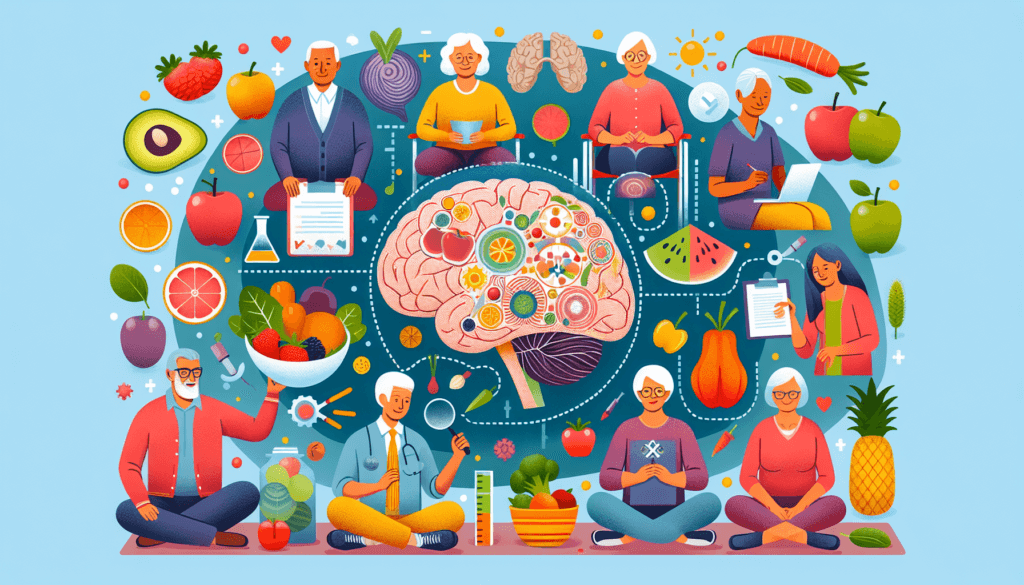Are you a boomer looking to maintain cognitive health as you age? If so, the answer might be as simple as focusing on your nutrition. As we get older, our brains undergo changes that can affect our cognitive abilities, but proper nutrition can play a crucial role in supporting brain health. By incorporating certain foods into your diet and adopting healthy eating habits, you can potentially enhance your cognitive function and preserve your mental clarity. This article will explore some key dietary tips and strategies specifically tailored for boomers who want to prioritize their cognitive health.

Importance of Nutrition for Cognitive Health
Proper nutrition plays a critical role in maintaining and improving cognitive health. As we age, it becomes even more important to pay attention to our dietary choices in order to support brain function and prevent cognitive decline. The food we eat provides the necessary nutrients for our brains to function optimally, and adopting a balanced and nutritious diet can have a profound impact on our cognitive abilities.
The Link Between Nutrition and Cognitive Health
Numerous studies have established a clear link between nutrition and cognitive health. The brain relies on a constant supply of nutrients to support its various functions, such as memory, attention, and problem-solving skills. A well-nourished brain is better equipped to handle cognitive tasks and is less susceptible to age-related decline.
Role of Nutrition in Preventing Cognitive Decline
In addition to supporting normal brain function, proper nutrition can also help prevent cognitive decline, such as dementia and Alzheimer’s disease. Research suggests that certain nutrients and dietary patterns can reduce the risk of developing these conditions and slow down their progression. By incorporating the right foods into your diet, you can support long-term cognitive health and preserve your mental abilities well into old age.
Essential Nutrients for Cognitive Health
Several key nutrients are particularly important for maintaining optimal cognitive health. Including these nutrients in your diet can provide your brain with the necessary building blocks for healthy function.
Omega-3 Fatty Acids
Omega-3 fatty acids, found in fatty fish like salmon and mackerel, are essential for brain health. These fatty acids play a crucial role in the structure and function of brain cells, and a deficiency may impair cognitive abilities. Including fish rich in omega-3s or taking fish oil supplements can help support cognitive health.
Antioxidants
Antioxidants are compounds that protect the brain from oxidative stress and damage caused by free radicals. Foods rich in antioxidants, such as berries, dark chocolate, and green tea, can help reduce inflammation and support brain function. Including these antioxidant-rich foods in your diet can have a positive impact on your cognitive health.
Vitamin B12
Vitamin B12 is vital for the production of red blood cells and maintaining the health of nerve cells. A deficiency in B12 can lead to cognitive impairments, including memory problems and difficulty concentrating. Animal products like meat, fish, and dairy are good sources of B12, and supplementation may be necessary for those following a plant-based diet.
Vitamin D
Vitamin D is known for its role in bone health, but it also plays a crucial role in cognitive function. Research suggests that low levels of vitamin D may increase the risk of cognitive decline and dementia. Sunlight is the best natural source of vitamin D, but it can also be obtained from fatty fish, fortified dairy products, and supplements.
Magnesium
Magnesium is involved in over 600 biochemical reactions in the body, including those related to brain function. It helps regulate neurotransmitters, which are essential for learning and memory. Foods rich in magnesium, such as leafy green vegetables, nuts, and seeds, should be included in your diet to support cognitive health.
Brain-Boosting Foods
Certain foods have been shown to have a positive impact on cognitive health. Including these brain-boosting foods in your diet can provide your brain with the nutrients it needs to function optimally.
Fatty Fish
Fatty fish, such as salmon, trout, and sardines, are excellent sources of omega-3 fatty acids. These fatty acids are essential for brain health and have been shown to improve cognitive function and reduce the risk of cognitive decline. Aim to include fatty fish in your diet at least twice a week to reap the cognitive benefits.
Berries
Berries, particularly blueberries, are rich in antioxidants and other beneficial compounds that have been linked to improved brain function. Studies have shown that regular consumption of berries may enhance memory and delay brain aging. Try incorporating a variety of berries, such as strawberries, raspberries, and blackberries, into your diet to reap the cognitive benefits.
Leafy Green Vegetables
Leafy green vegetables, like spinach, kale, and broccoli, are packed with essential nutrients, including magnesium, vitamin K, and folate. These nutrients are important for brain health and have been associated with improved cognitive function. Including leafy greens in your diet can help nourish your brain and support optimal cognitive performance.
Nuts and Seeds
Nuts and seeds are rich in antioxidants, healthy fats, and other brain-boosting nutrients. Almonds, walnuts, flaxseeds, and chia seeds are particularly beneficial for cognitive health. These foods have been shown to improve memory and cognitive function when incorporated into a balanced diet. Enjoy a handful of nuts or sprinkle seeds on your meals to give your brain a nutritious boost.
Turmeric
Turmeric, the spice responsible for giving curry its yellow color, contains a compound called curcumin. Curcumin has powerful anti-inflammatory and antioxidant properties, which can positively influence brain health. Research suggests that curcumin may help improve memory and reduce the risk of cognitive decline. Including turmeric in your cooking or taking curcumin supplements can support cognitive function.
The Mediterranean Diet and Cognitive Health
The Mediterranean diet is a well-known dietary pattern that has been associated with numerous health benefits, including cognitive health.
Overview of the Mediterranean Diet
The Mediterranean diet is primarily plant-based and emphasizes whole, unprocessed foods such as fruits, vegetables, whole grains, legumes, nuts, and olive oil. It also includes moderate consumption of fish, poultry, and dairy products, while limiting red meat and sweets. This dietary pattern is rich in antioxidants, healthy fats, vitamins, and minerals, making it ideal for supporting cognitive health.
Benefits for Cognitive Function
Studies have consistently shown that adherence to the Mediterranean diet is associated with improved cognitive function and a reduced risk of cognitive decline. The abundance of brain-boosting foods in this diet, such as fish, fruits, vegetables, and olive oil, provides the necessary nutrients to support brain health. Following the Mediterranean diet can help protect against age-related cognitive decline and preserve your cognitive abilities.

The Role of Hydration in Cognitive Health
Staying hydrated is not only important for overall health but also plays a critical role in maintaining cognitive function.
Effects of Dehydration on Cognitive Function
Even mild dehydration can have a negative impact on cognitive performance. Research has shown that dehydration can impair attention, memory, and problem-solving skills, making mental tasks more challenging. It is essential to keep your body adequately hydrated to ensure optimal brain function.
Tips for Staying Hydrated
To maintain proper hydration and support cognitive health, it is recommended to drink enough water throughout the day. The general guideline is to aim for at least eight glasses of water per day, but individual needs may vary. Additionally, consuming hydrating foods, such as fruits and vegetables that have high water content, can contribute to your overall hydration levels. Remember to listen to your body’s thirst cues and prioritize regular hydration to support your cognitive abilities.
Meal Planning for Cognitive Health
Proper meal planning is crucial for supporting cognitive health and ensuring a well-rounded diet.
Incorporating Brain-Boosting Foods into Your Diet
When planning your meals, prioritize the inclusion of brain-boosting foods. Incorporate fatty fish, berries, leafy green vegetables, nuts, seeds, and turmeric into your recipes to provide your body with the necessary nutrients for optimal cognitive function. Experiment with different recipes and food combinations to make your meals both delicious and beneficial for your brain.
Balancing Nutrients in Meals
Aim for a balanced combination of macronutrients – carbohydrates, proteins, and fats – in your meals. This balance helps regulate blood sugar levels, provide sustained energy, and support brain function. Incorporate whole grains, lean proteins, healthy fats, and a variety of fruits and vegetables into your meals to ensure you get all the necessary nutrients for cognitive health.
Meal Frequency and Portion Control
Consider the frequency and portion sizes of your meals as part of your meal planning. It is generally recommended to eat smaller, more frequent meals throughout the day to optimize cognitive function. This approach helps maintain stable blood sugar levels and prevents energy crashes. Additionally, practicing portion control can prevent overeating and support a healthy weight, which is also essential for cognitive health.

Avoiding Harmful Foods for Cognitive Health
In addition to incorporating brain-boosting foods into your diet, it is equally important to avoid or limit certain foods that can be detrimental to cognitive health.
Processed and Sugary Foods
Processed and sugary foods, such as fast food, sugary beverages, and processed snacks, should be minimized in your diet. These foods are often high in unhealthy fats, added sugars, and artificial additives, which can contribute to inflammation and negatively impact brain function. Opt for whole, unprocessed foods whenever possible to support cognitive health.
Trans Fats
Trans fats, commonly found in fried and processed foods, have been shown to increase the risk of cognitive decline and impair memory function. Avoid foods that contain partially hydrogenated oils, as they are likely to contain trans fats. Instead, choose healthier fat sources, such as olive oil, avocado, and nuts, to nourish your brain.
High Sodium Intake
Consuming excessive amounts of sodium can lead to high blood pressure, which is associated with an increased risk of cognitive decline. It is important to reduce your sodium intake by limiting the consumption of processed and packaged foods, as they tend to be high in sodium. Opt for fresh ingredients and season your meals with herbs and spices instead of relying on salt for flavor.
The Impact of Lifestyle Factors on Cognitive Health
In addition to nutrition, certain lifestyle factors play a crucial role in maintaining cognitive health.
Physical Activity
Regular physical activity is not only beneficial for your physical health; it also has a positive impact on cognitive function. Exercise increases blood flow to the brain, promotes the growth of new brain cells, and improves memory and cognitive abilities. Aim for at least 150 minutes of moderate-intensity exercise per week to reap these cognitive benefits.
Quality Sleep
Adequate sleep is essential for optimal cognitive function. During sleep, the brain consolidates memories and clears out toxins, ensuring its proper functioning the next day. Lack of sleep can impair attention, concentration, and cognitive performance. Aim for 7-9 hours of quality sleep each night to support your brain’s health and cognitive abilities.
Stress Management
Chronic stress has been linked to cognitive decline and an increased risk of developing neurodegenerative conditions. Engaging in stress-reducing activities, such as meditation, yoga, or spending time in nature, can help protect your brain from the harmful effects of stress. Prioritize self-care practices and find healthy ways to cope with stress to support your cognitive health.

Supplements for Cognitive Health
While a balanced diet should provide most of the necessary nutrients for cognitive health, certain supplements can be beneficial.
Fish Oil Supplements
Fish oil supplements are a popular choice for those looking to boost their omega-3 fatty acid intake. They provide a concentrated dose of EPA and DHA, the two omega-3 fatty acids essential for brain health. Consult with your healthcare provider before starting any new supplement regimen.
Multivitamins
Multivitamins can help fill any nutritional gaps in your diet and ensure you’re getting all the necessary vitamins and minerals for cognitive health. However, it’s important to choose a high-quality multivitamin and consult with a healthcare professional to determine if supplementation is necessary for you.
Ginkgo Biloba
Ginkgo biloba is an herb that has been used in traditional medicine for centuries. It is believed to improve cognitive function and memory. While research on its effectiveness is mixed, some studies suggest that ginkgo biloba may have a positive impact on cognitive health. Talk to your healthcare provider before taking ginkgo biloba supplements.
Curcumin
Curcumin, the active compound in turmeric, has shown promise in improving memory and cognitive function. It has strong anti-inflammatory and antioxidant properties, which contribute to its potential brain-boosting effects. Consider adding curcumin supplements to your routine, but consult with a healthcare professional beforehand.
Seeking Professional Advice
When it comes to nutrition and cognitive health, it is always best to seek professional advice.
Consulting a Registered Dietitian
A registered dietitian can provide personalized guidance and recommendations based on your unique needs and health goals. They can help you create a tailored meal plan that supports cognitive health, taking into consideration any dietary restrictions or health conditions you may have. A dietitian will ensure that you are getting the right balance of nutrients and can answer any questions you may have about nutrition and cognitive health.
Considering Individual Health Conditions
Individual health conditions and medications may influence dietary recommendations for cognitive health. It is important to consult with your healthcare provider, especially if you have specific health concerns or are taking medications that may interact with certain nutrients or supplements. Your healthcare team can provide personalized advice and ensure that your nutrition choices align with your overall healthcare plan.
In conclusion, maintaining cognitive health through nutrition is crucial for individuals, especially boomers, who want to optimize their brain function and prevent cognitive decline. By including essential nutrients, consuming brain-boosting foods, following the Mediterranean diet, staying hydrated, engaging in meal planning, avoiding harmful foods, considering lifestyle factors, and seeking professional advice, you can take proactive steps towards supporting your cognitive health and enjoying a vibrant and sharp mind throughout your life.



